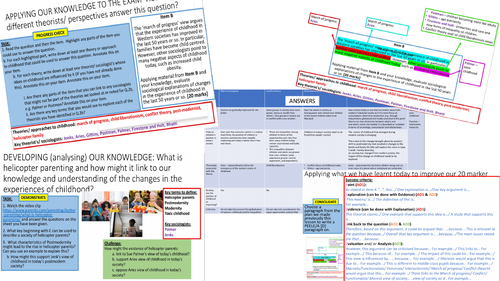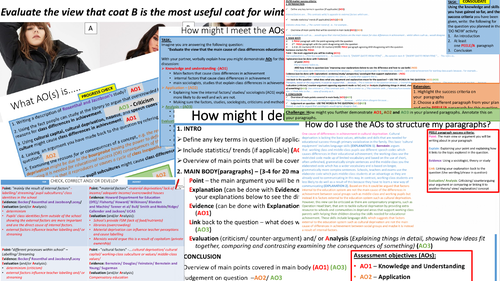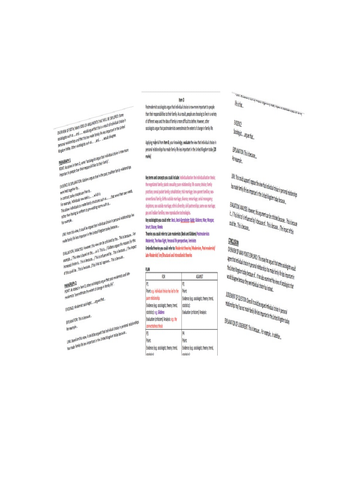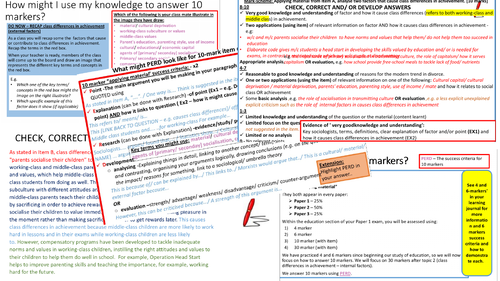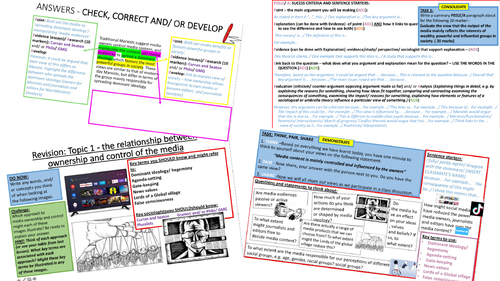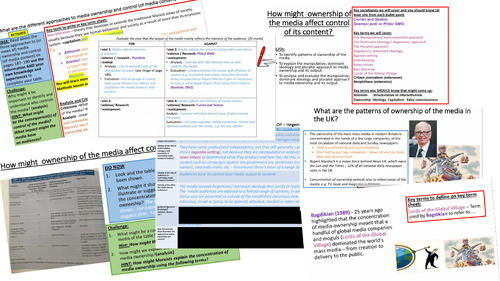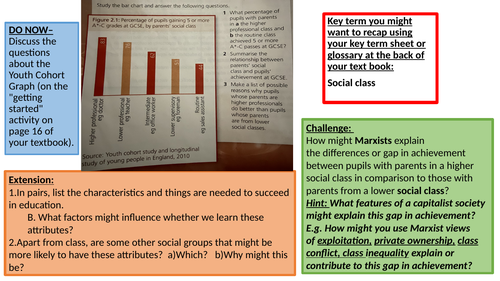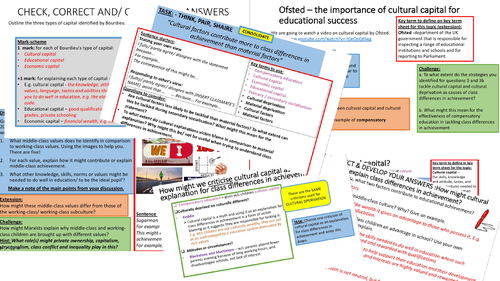
177Uploads
22k+Views
5k+Downloads
Sociology

A-level Sociology Education Class differences in achievement - Labelling
Detailed and differentiated (up and down), student led lesson that explores labelling, self-fulfilling-prophecy/ pygmallion effect, determinism and interactionism to enable students to understand the role of labelling in causing class differences in achievement/ working-class underachievement/ middle-achievement.
**ANSWERS TO MOST ACTIVITIES **
**COMES WITH FREE A-LEVEL HELP SHEET
**Made for AQA A-level but can be easily used for other specs (just need a different source of information/ textbook) **
Uses and refers to ’ AQA A Level Sociology Book One Including AS Level: Book one 3rd Revised edition by Rob Webb, Hal Westergaard, Keith Trobe, Annie Townend ’ textbook

AQA A-level Sociology: Families Topic 2 ‘Childhood’ Revision lesson
Detailed and differentiated (up and down) student led lesson that supports students in recapping the main theories, views and explanations of the position of childhood; examines how march of progress, conflict, child liberationists and postmodernist theories’ view society and how this might influence their approach or view of childhood and its changes over time. Also highlights the key sociologists (Katz, Postman, Aries, Palmer, Jenks, Gittens) in this topic.
The lesson then requires students to apply this knowledge to plan (using a success criteria) a 20 marker and write at least one paragraph for it.
RESOURCES CAN BE FOUND AT THE END OF THE PPT.
MODEL PLAN AND ANSWERS FOR MAIN ACTIVITY CAN BE FOUND ON NEXT SLIDE AFTER ACTIVITY SLIDE

WRITING FRAME - AQA A-level Sociology: Families – Topic 3 Theories of the family 20 marker
Detailed writing frame that scaffolds (from introduction to conclusion) a full answer for a 20 marker on the family being beneficial (family -topic 3 theories of the family). Models how to use the item to select points or arguments to answer the question.
*** Based on AQA specification**
Supports students with planning the 20 marker (using the item) - using planning success criteria.
Outlines the success criteria and provides sentence starters for the full essay (intro, main body and conclusion). Success criteria used for paragraphs in main body of essay is PEELE/A
Outlines the key terms, sociologists, theories that can be used when answering the question.
Supports students who need support and guidance with writing essays whilst providing students who are already good at writing essays opportunities to further improve their essay skills.

Sociology Education Class differences in achievement- How to answer 30/ 20 markers?
Detailed and differentiated (up and down), student led lesson that explores:
the main assessement objectives - AO1, AO2, AO3
how to answer 30 markers
allows studeNts to revise class differences in achievement (external and internal factors).
**Can also be used as a revision lesson for topic 2 (class diff in achievement -internal factors) Includes student friendly success criteria for essay **
ANSWERS TO MAIN ACTIVITIES AND MODEL ANSWER INCLUDED
Made for AQA A-level but is applicable for AS-Level and can be used for ANY SPEC and is still paplicable for GCSE essays

WRITING FRAME - AQA A-level Sociology: Families – Topic 6 Family diversity 20 marker
Detailed writing frame that scaffolds (from introduction to conclusion) a full answer for a 20 marker on evaluating the view that individual choice in personal relationships has made family life less important in the United Kingdom today (family -topic 6 family diversity).
*** Based on AQA specification**
Models and supports students with how to use the item to select points or arguments to answer the question and how to plan essays using planning success criteria.
Outlines the success criteria and provides sentence starters for the full essay (intro, main body and conclusion). Success criteria used for paragraphs in main body of essay is PEELE/A
Outlines the key terms, sociologists, theories that can be used when answering the question.
Supports students who need support and guidance with writing essays whilst providing students who are already good at writing essays opportunities to further improve their essay skills.

How to answer 10 markers for Sociology Education Class differences in achievement (external factors)
Detailed and differentiated (up and down), student led lesson that explores how to answer 10 markers, in particular for education topic 1 - class differences in achievement (external factors). Can also be used as a revision lesson for topic 1 (class diff in achievement -external factors) Includes student friendly success criteria PERD (Point+Explanation+Research+Develop) success criteria and student-friendly mark-scheme.
ANSWERS TO MAIN ACTIVITIES AND EXAM QUESTIONS ARE INCLUDED
**Made for AQA A-level but can be easily used for other specs (just need a different source of information/ textbook) differentiated down for GCSE) lesson **

AQA A-level Sociology: Media Topic 1 Ownership and control Revision lesson
Detailed and diiferentiated (up and down), student led lesson that recaps:
patterns of ownership
the mainpulative, hegemonic and plurlaist approach to media ownerhsip and control
formal and informal controls of media output or content.
References the following concepts: Agenda-setting Gate-keeping News values Marxism Structuralism vs Interactionism
Ownership Ideology Capitalism False consciousness Neo-Marxism
Lords of the Global Village Formal and informal methods of control.
ANSWERS INCLUDED FOR SOME MAIN ACTIVITIES INCLUDED**
RESOURCES FOR LESSON CAN BE FOUND AT THE END OF PTT
Made for AQA A-level but can be easily used for other specs (just need a different source of information/ textbook)
**Based on the content in 'SOCIOLOGY For AQA Volume 2 by Browne, Blundell & Law **

AQA A-level Sociology: Media Topic 1 - Ownership and control of output
Detailed and differentiated (up and down), student led lesson that allows students to examine patterns of media ownership and the three main approaches (manipulative, hegemonic and pluralist) to media ownership and control of media output. Also introduces studets to the difference between Marxism and Neo-Marxism and links to structural vs humanistic marxism and structural determinsm. Examines the following concepts to do this: Ideology, Hegemony, Agenda-setting, Gate-keeping, News values, Marxism Neo-Marxism, Lords of the Global Village.
ANSWERS TO MAIN ACTIVITIES INCLUDED**
RESOURCES FOR LESSON CAN BE FOUND AT THE END OF PTT
Made for AQA A-level but can be easily used for other specs (just need a different source of information/ textbook)
**REQUIRES textbook - 'SOCIOLOGY For AQA Volume 2 by Browne, Blundell & Law **

Sociology Education Class differences in achievement (internal factors) - Class identities
Detailed and differentiated (up and down), student led lesson that explores pupil identity, class identities, habitus, symbolic capital, symbolic violence, nike identities, style performances to enable students to understand the role of class identities in causing class differences in achievement/ working-class underachievement/ middle-class achievement. Also covers and supports students in answering 4/6 markers using a success criteria and student-friendly mark-schemes.
ANSWERS TO MAIN ACTIVITIES AND EXAM QUESTIONS ARE INCLUDED
COMES WITH FREE A-LEVEL HELP SHEET AND KEY TERM SHEET FOR TOPIC 1 & 2
**Made for AQA A-level but can be easily used for other specs (just need a different source of information/ textbook) differentiated down for GCSE) lesson **
Uses and refers to ’ AQA A Level Sociology Book One Including AS Level: Book one 3rd Revised edition by Rob Webb, Hal Westergaard, Keith Trobe, Annie Townend ’ textbook

AQA A-level Sociology: Education Class - Material deprivation
Detailed and diiferentiated (up and down), student led lesson that explores class differences in achievement the role of material deprivation in causing or contributing to it. Introduces students to material vs cultural factors and external vs internal factors. Also introduces students to how to answer 4 and 6 markers using a success criteria and student-friendly mark-schemes.
ANSWERS TO MAIN ACTIVITIES AND EXAM QUESTIONS ARE INCLUDED
**Made for AQA A-level but can be easily used for other specs (just need a different source of information/ textbook) differentiated down for GCSE) lesson **
Uses and refers to ’ AQA A Level Sociology Book One Including AS Level: Book one 3rd Revised edition by Rob Webb, Hal Westergaard, Keith Trobe, Annie Townend ’ textbook

Sociology Education Class differences in achievement - Cultural capital
Detailed and differentiated (up and down), student led lesson that explores cultural, educational and economic capital and compensatory education to enable students to understand the role of cultural capital in causing class differences in achievement/ middle-class achievement. Also covers and supports students in answering 4/6 markers using a success criteria and student-friendly mark-schemes.
ANSWERS TO MAIN ACTIVITIES AND EXAM QUESTIONS ARE INCLUDED
COMES WITH FREE A-LEVEL HELP SHEET AND KEY TERM SHEET FOR TOPIC 1 & 2
**Made for AQA A-level but can be easily used for other specs (just need a different source of information/ textbook) differentiated down for GCSE) lesson **
Uses and refers to ’ AQA A Level Sociology Book One Including AS Level: Book one 3rd Revised edition by Rob Webb, Hal Westergaard, Keith Trobe, Annie Townend ’ textbook

AQA A-level Sociology: Media - Media representations of sexuality
Detailed lesson with lots of scaffolding based on adaptive teaching that help students understand ‘Media - Media representations of sexuality’
Cover the following key terms :Sexuality, Sexual orientation, Lesbians, Gays, ‘Pink pound’, Sanitisation of gay sexuality , Over-sexualisation of lesbian sexuality (optional) , Heterosexuality , Homosexuality , Heterosexual gaze
Cover the following sociologist:McRobbie (1994), Gill (2007), Gross (1991), Stonewall (2010), Cowan (2007), Cowan and Valentine (2005)
Lesson is made up of comprehension questions that students need to answer using the information in textbook - 'SOCIOLOGY For AQA Volume 2 by Browne, Blundell & Law on this.
INCLUDES DETAILED ANSWERS TO ALL ACTIVITIES

AQA GCSE Sociology: Research Methods- Longitudinal studies
Detailed lesson with lots of scaffolding based on adaptive teaching that help students understand longitudinal studies.
Cover the following key terms: longitudinal study, cohort, cross-sectional study
Covers the following sociologists: the UP series, The Millennium Cohort study
Makes references to key terms students should know- CHECK IF THIS IS THE CASE - Promotes a spiral curriculum by making links to key terms that students might have previously been taught that link to this lesson.
RESOURCES CAN BE FOUND AT THE END OF PPT
NO starter activity included
ANSWERS TO MOST ACTIVITIES INCLUDED
Includes student-friendly mark scheme for a 4 and 2 markers
Includes model answer for 4 marker
Teaches students how to answer 2 marker using an item
Includes so model 2 mark answers and answers that would not be awarded 2/2.

AQA GCSE Sociology: Family- Marxist functions of the family (Zaretsky)
Detailed lesson with lots of scaffolding based on adaptive teaching that help students understand marxist functions of the family (Zaretsky)
Includes key term sheet with definitions for the lesson (new key terms but also key terms that students should have been taught previously that link to this lesson)
Includes 4 marker ‘perspective’ exam question and provides scaffolding to help students answer it and includes student friendly mark-scheme for peer or self assessment.
ANSWERS TO MAIN ACTIVITIES INCLUDED
Covers the following key terms: Unit of consumption, The Marxist Warm Bath Theory, Socialism
Covers the following key sociologists: Zaretsky
Covers the following key terms that should already be known: Family form – Convention nuclear family – Bourgeoisie - Proletariat – Unit of consumption – Economic function – Stabilisation of adult personalities (The Warm Bath theory) - The traditional domestic division of labour - The contemporary domestic division of labour -Capitalism - Marxism - Profit - Social class - Ownership – Exploit - Inequality - Capitalism - Means of production - Structuralism vs Interactionism - Conflict vs Consensus theory - Agency of socialisation - Agents of socialisations – Systems – Processes - Agency of social control - Agents of social control - Culture - Norms - Values Social processes - Social structures - Positive sanctions Negative sanctions - Socialisation - Primary socialisation - Secondary socialisation
Makes references to key terms students should know – Promotes a spiral curriculum by making links to key terms that students might have previously been taught that link to this lesson.
RESOURCES CAN BE FOUND AT THE END OF PPT

AQA GCSE Sociology - Research Methods: Questionnaires
Detailed lesson with lots of scaffolding based on adaptive teaching that help students understand how to use questionnaires when investigating sociological issues (e.g. the main features of questions and describe when its appropriate to use, the strengths and weaknesses of questionnaires based on their main features and how to apply our knowledge of the strengths and weaknesses of questionnaires to different sociological research topic.
Examines questionnaires in general and postal questionnaires.
Makes links to practical ethical and theoretical issues.
Covers the following key terms: Questionnaires, Postal questionnaires
Key terms you should know that link:
Quantitative data vs Qualitative data – Reliable vs Valid – Practical issues – Ethical issues – Theoretical issues – Positivism vs Interpretivist – Sample size – Representative sample – Generalise findings - Social surveys – Questionnaire - Pre-determined - Closed questions - Open questions - Postal questionnaires - Online questionnaire
INCLUDES ANSWERS FOR ACTIVITIES
Includes model answer, student friendly mark-scheme and example answers ranging from 1-4/ 4 for a research method 4 marker
RESOURCES CAN BE FOUND AT THE END OF PPT

AQA GCSE Sociology - Education: Alternative forms of education
Detailed lesson with lots of scaffolding based on adaptive teaching that help students understand alternative forms of traditional education (e.g. describe the alternative forms of educational provision, explain how the different forms of educational provision differ to traditional forms of education, analyse and evaluate the alternative forms of educational provision.
Covers the following key terms: Home education/ home-schooling, Democratic education/ de-schooling, Vocational education and training
Key sociologists mentioned that students should already be aware of: Illich (extension)
Answers to all main activities included
Resources can be found at the end of the PPT

AQA GCSE Sociology: Education - Functionalists' roles of education
Detailed lesson with lots of scaffolding based on adaptive teaching that help students understand ‘Education - Functionalists’ roles of education’
Covers the following key terms: Meritocracy, Particularistic standards, Universalistic standards, Ascribed status, Achieved status, Formal curriculum, Hidden curriculum, Social cohesion, Social mobility, Role allocation
Covers the following sociologists:Durkheim, Parsons, Davis and Moore
ANSWERS TO MAIN ACTIVITIES INCLUDED
Includes a 4 marker with scaffolding to answer it
Includes visual learning icons
Includes a key term and definitions sheet needs for the lesson
Students need access to a textbook to complete the main activity. Although this is a GCSE lesson, I use the A-level textbook (
AQA A Level Sociology Book One Including AS Level: Book one 3rd Revised edition by Rob Webb, Hal Westergaard, Keith Trobe, Annie Townend)

Education - Class differences in education (Cultural capital)
Includes a 3 marker with detailed scaffolding to help students answer it. Student friendly mark-scheme included for this 3 marker.
SOME ANSWERS INCLUDED.
Includes key term sheet with definitions needed for the lesson.
Includes dicsussion activity with prompts to promote oracy

AQA GCSE Sociology: Crime - Sources of statistical data on crime
Detailed lesson with lots of scaffolding based on adaptive teaching that help students understand the three main sources of statistical data on crime, how they collect data on crime and the strength and weaknesses of them.
Examines the following key terms: Source of statistical data on crime Official (government) crime statistics Reported crime Recorded crime Dark figure of crime The Social Construction of Official Crime statistics Victim survey Self-report study
Makes links with the following key terms that students should know (mainly if they studied the research methods unit before starting crime: Social construct Standardise Quantitative Data Qualitative Data Validity Reliability Representative (sample) Generalise
ANSWERS TO MAIN ACTIVITIES INCLUDED
Includes key term and definitions sheet for the lesson included
The Owens and Woodfield GCSE Sociology textbook is needed for the main activities

AQA GCSE Sociology - family: Functionalist function of the family (Murdock)
Detailed lesson with lots of scaffolding based on adaptive teaching that help students criticise Murdock’s four functions of the family and analyse them by considering how they might benefit individuals and society as a whole.
Cover the following key terms:
Sexual function
Reproductive function
Education function
Economic function
Covers the following sociologists:
Murdock
ANSWERS TO SOME/ MOST/ ALL MAIN ACTIVITIES INCLUDED
*Key terms students should know:
Symmetrical family, Dual burden, Dual career families, Triple shift, Emotion work, Child-rearing,Primary socialisation, Segregated conjugal roles, joint conjugal roles, Expressive role, instrumental role, Breadwinner, Functionalism, Organic analogy
RESOURCES CAN BE FOUND AT THE END OF PPT
Includes 'teaching to all activity
ANSWERS FOR ACTIVITIES INCLUDED
Plenary helps students develop their ability to read and interpret exam items.
Includes a key term and definition sheet for the lesson (new key terms but also makes links to key terms students should have previously learnt)
Includes key term and definition sheet for the lesson


